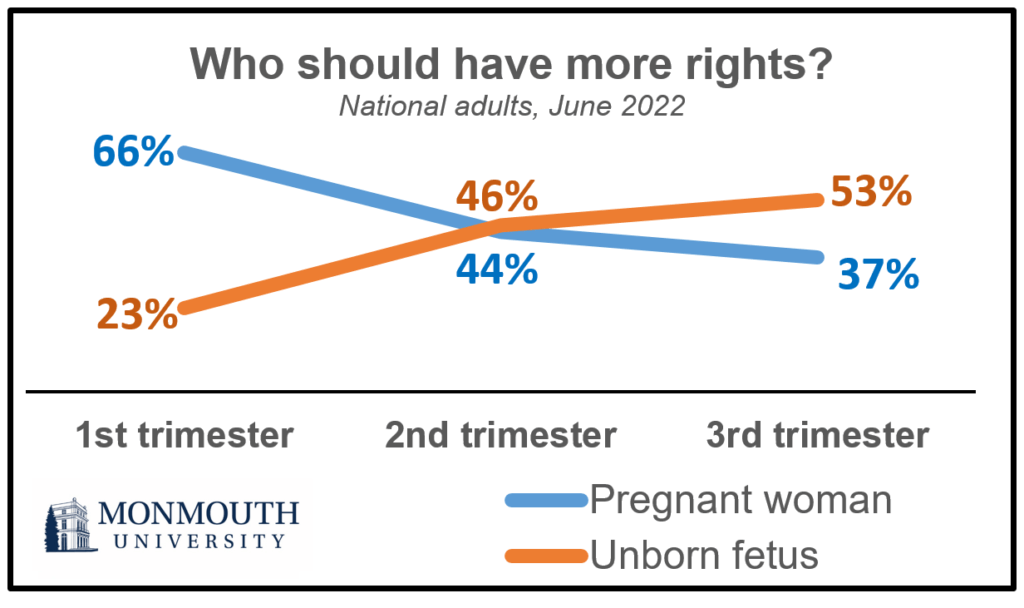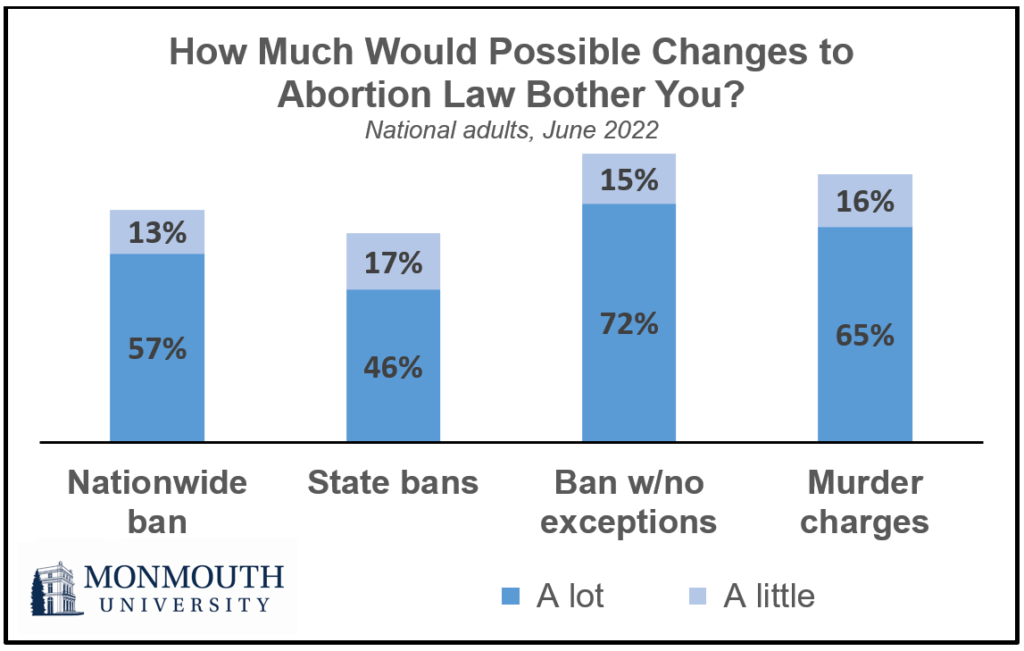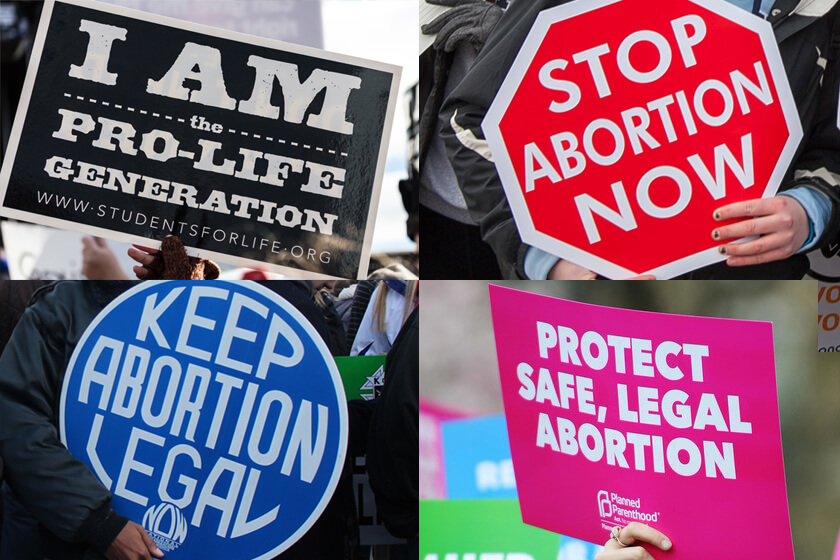West Long Branch, NJ – Six in ten Americans disapprove – nearly all of them strongly – of the U.S. Supreme Court’s decision to overturn Roe v. Wade. The Monmouth (“Mon-muth”) University Poll finds two-thirds of the public feels a pregnant woman should be afforded more rights than an unborn fetus during the first trimester, although opinion is more divided during the second trimester. Overall opinion of how abortion access should be treated under the law remains stable, with more than 6 in 10 saying it should be legal in most cases. Very few Americans back abortion bans that provide no exceptions or support state laws that prosecute residents for having out-of-state abortions. Public disapproval of the Supreme Court has risen by 11 points since before the ruling was first leaked last month.
A majority of 60% disapprove of overturning the Roe v. Wade precedent that has guided abortion law in the United States for nearly 50 years, while 37% approve. More than 8 in 10 Americans describe their view of the court decision as being a strongly held opinion. When asked about viewing abortion as a question of competing rights, 66% say the pregnant woman should be afforded more rights during the first three months, while 23% say the unborn fetus should have more rights. Opinion is split on relative rights during the second trimester – 46% say the fetus should have more rights and 44% say the woman should. During the final three months of pregnancy, 53% say the rights of the unborn fetus should prevail while 37% say the pregnant woman should have more rights.

“The high court’s legal opinion does not coincide with what the majority of Americans see as a woman’s right, at least through the first trimester,” said Patrick Murray, director of the independent Monmouth University Polling Institute.
Americans’ views of abortion access have remained stable since Friday’s ruling. More than 6 in 10 Americans support keeping the procedure legal – either always legal (36%) or with some limitations (30%). Another 22% say it should be illegal except for rape, incest or to save the mother’s life and 10% say it should always be illegal. The number who say abortion should be legal in most cases (66%) has changed very little from May (64%), when the court’s decision was first leaked to the public, and remain in line with prior Monmouth polls on this question in 2021 (62%) and 2019 (63%).
The poll finds some gender-based differences in abortion opinion, but in most cases those variations are due more to the difference in underlying partisanship for women and men. For example, there is a 14-point gap between women (73%) and men (59%) who feel that abortion should be legal, either always or with some limits. However, that difference is more than halved when controlling for partisanship, resulting in just a 7-point gender gap among Republican identifiers/leaners (45% women and 38% men) and only a 4-point gap among Democratic identifiers/leaners (93% women and 89% men) – although Democratic women (68%) are more likely than men (52%) to say it should be legal without limitations. There is a 22-point overall gender gap between women (27%) and men (49%) approving of the Supreme Court’s decision to overturn Roe. That difference is seen more among Republicans where differently sized majorities of both women (61%) and men (78%) support the court’s ruling. Democrats, on the other hand, display nearly no gender gap on disapproval of the decision (96% women and 89% men). Additionally, gender-based differences in opinion of whether a woman or fetus should have more rights are due primarily to the fact that more women identify as Democrats and more men as Republicans.
“When it comes to public opinion of abortion policy, the driving factor is partisanship rather than biology,” said Murray.
Now that Roe has been overturned, just under half (46%) of the public would like Congress to pass a law allowing abortion nationwide, while 44% prefer to leave abortion law up to the states. Just 7% want a national ban. Most Democrats (80%) want a national law allowing abortion and most Republicans (69%) want to leave abortion law to the states. These results are basically unchanged from May. Nearly 6 in 10 Americans (57%) say they would be bothered a lot if abortion was banned nationwide and just under half (46%) would be bothered a lot if certain states banned abortion. Both of these results are slightly higher than Monmouth’s poll last month.
Some states are already implementing, or about to implement, abortion bans. The vast majority of Americans (85%) say these bans should include exceptions for rape, incest, and when the life of the mother is at risk. Only 11% say these bans should not include these exceptions. Also, 87% oppose allowing states that criminalize abortion to bring a woman to court for having an abortion in another state where it is legal. Just 10% say that the home state should be able to prosecute a woman for an out-of-state abortion.
More than 8 in 10 residents in both red and blue states – i.e., states won by either Donald Trump or Joe Biden in 2020 – back exceptions for rape, incest or the life of the mother and oppose the prosecution of out-of-state abortions. Just 11% of red state residents oppose any exceptions to an abortion ban and 13% of red state residents would allow court proceedings for out-of-state abortions.
“Legislatures in conservative states that are enacting draconian abortion bans appear to be imposing provisions that represent a fringe view even within their own states,” said Murray.
The poll finds that 72% of the public would be bothered a lot if abortion bans did not include any exceptions (including 76% in blue states and 68% in red states) and 65% would be bothered a lot if states treated illegal abortions as a felony where the woman or her doctor could be charged with murder (including 72% in blue states and 56% in red states).

The poll also asked about the direct impact of Roe being overturned. Only 3 in 10 Americans say individual states being able to ban or restrict abortion would personally impact them or their family – 13% say it would impact them a great deal and 17% say some. On the other hand, half (50%) feel they will not be impacted at all and another 18% do not expect much impact.
Over half the public says it is either very (29%) or somewhat (27%) likely that the Supreme Court will also overturn its decision that legalized same-sex marriage. A greater number of Democrats (83%) than Republicans (38%) feel this decision is at least somewhat likely to be reversed now that Roe has been overturned.
Public opinion of the Supreme Court grew negative after the abortion ruling was leaked last month and is basically holding at that position now that the decision is official. About 4 in 10 (41%) Americans currently approve of the job the court is doing while a majority of 53% disapprove. Last month, these numbers were 38% approve and 52% disapprove. Before the leak, though, the court had an evenly divided rating of 42% approve to 42% disapprove. That March poll showed 16% with no opinion of the Supreme Court. This has shrunk to 7% today, with practically all of the shift going into the disapprove column.
Compared to the March pre-leak poll, disapproval of the Supreme Court’s job performance has climbed among both Democrats (from 54% in March to 79% now) and independents (from 37% to 52%). At the same time, the court’s approval rating has improved among Republicans (from 52% in March to 70% now). Six years ago, 65% of Democrats versus 36% of Republicans approved of the Supreme Court.
Just under 4 in 10 Americans (38%) support expanding the Supreme Court from its current size of nine justices. Most Democrats (63%) support this idea while few Republicans (12%) do. These results are largely unchanged from September 2021.
The Monmouth University Poll was conducted by telephone from June 24 to 27, 2022 with 747 adults in the United States. The question results in this release have a margin of error of +/- 3.6 percentage points. The poll was conducted by the Monmouth University Polling Institute in West Long Branch, NJ.
QUESTIONS AND RESULTS
(* Some columns may not add to 100% due to rounding.)
[Q1-4 held for future release.]
5.Do you approve or disapprove of the job the U.S. Supreme Court is doing?
| TREND: | June 2022 | May 2022 | March 2022 | Sept. 2021 | March 2016 |
| Approve | 41% | 38% | 42% | 42% | 49% |
| Disapprove | 53% | 52% | 42% | 45% | 33% |
| (VOL) Don’t know | 7% | 10% | 16% | 12% | 17% |
| (n) | (747) | (807) | (809) | (802) | (1,008) |
5A.The Supreme Court currently has nine justices. Would you support or oppose expanding the size of the Supreme Court?
| TREND: | June 2022 | Sept. 2021 |
| Support | 38% | 36% |
| Oppose | 56% | 58% |
| (VOL) Don’t know | 6% | 6% |
| (n) | (747) | (802) |
[Q6-21 held for future release.]
22.Which comes closest to your view on abortion: it should always be legal, it should be legal with some limitations, it should be illegal except for rape, incest or to save the mother’s life, or it should always be illegal?
| TREND: | June 2022 | May 2022 | Sept. 2021 | June 2019 |
| Always legal | 36% | 33% | 33% | 32% |
| Legal with limitations | 30% | 31% | 29% | 31% |
| Illegal with exceptions | 22% | 26% | 24% | 24% |
| Always illegal | 10% | 8% | 11% | 10% |
| (VOL) Don’t know | 2% | 2% | 2% | 3% |
| (n) | (747) | (807) | (802) | (751) |
23.The Roe versus Wade decision, which has guided abortion law in the United States since 1973, was overturned by the Supreme Court on Friday. Do you approve or disapprove of the court overturning Roe? [Do you approve/disapprove strongly or somewhat?]
| June 2022 | |
| Strongly approve | 29% |
| Somewhat approve | 8% |
| Somewhat disapprove | 7% |
| Strongly disapprove | 53% |
| (VOL) Don’t know | 3% |
| (n) | (747) |
23A.Abortion is sometimes viewed as a question of rights. During the first three months of pregnancy, who should be afforded more rights – the woman who is pregnant or the unborn fetus?
| June 2022 | |
| Woman | 66% |
| Unborn fetus | 23% |
| (VOL) Both equally | 5% |
| (VOL) Don’t know | 5% |
| (n) | (747) |
23B.During the second three months of pregnancy – that is months 4 through 6 – who should be afforded more rights – the woman who is pregnant or the unborn fetus?
| June 2022 | |
| Woman | 44% |
| Unborn fetus | 46% |
| (VOL) Both equally | 5% |
| (VOL) Don’t know | 4% |
| (n) | (747) |
23C.During the final three months of pregnancy, who should be afforded more rights – the woman who is pregnant or the unborn fetus?
| June 2022 | |
| Woman | 37% |
| Unborn fetus | 53% |
| (VOL) Both equally | 6% |
| (VOL) Don’t know | 4% |
| (n) | (747) |
24.Now that Roe has been overturned and individual states are allowed to make their own laws banning or restricting abortions, how much do you think it will personally impact you and your family – a great deal, some, not much, or not at all?
| TREND: | June 2022 | May 2022* |
| A great deal | 13% | 15% |
| Some | 17% | 14% |
| Not much | 18% | 16% |
| Not at all | 50% | 53% |
| (VOL) Don’t know | 2% | 2% |
| (n) | (747) | (807) |
* May 2022 wording was “If Roe is overturned…”
25.Now that Roe has been overturned, what would you like to see Congress do – pass a law allowing abortions nationwide, pass a law banning abortions nationwide, or leave abortion law up to the individual states?
| TREND: | June 2022 | May 2022* |
| Pass law allowing | 46% | 44% |
| Pass law banning | 7% | 9% |
| Leave up to the states | 44% | 43% |
| (VOL) Don’t know | 3% | 3% |
| (n) | (747) | (807) |
* May 2022 wording was “If Roe is overturned…”
26.How much would it bother you if abortion was banned nationwide – a lot, a little, or not at all?
| TREND: | June 2022 | May 2022 |
| A lot | 57% | 51% |
| A little | 13% | 15% |
| Not at all | 30% | 33% |
| (VOL) Don’t know | 1% | 1% |
| (n) | (747) | (807) |
27.How much would it bother you if abortion was banned in certain states – a lot, a little, or not at all?
| TREND: | June 2022 | May 2022 |
| A lot | 46% | 42% |
| A little | 17% | 21% |
| Not at all | 36% | 37% |
| (VOL) Don’t know | 1% | 0% |
| (n) | (747) | (807) |
27A.Several states are already set to ban abortion now that Roe has been overturned. Do you think these bans should or should not include exceptions in cases of rape, incest, or when the life of the mother is at risk?
| June 2022 | |
| Should | 85% |
| Should not | 11% |
| (VOL) Don’t know | 3% |
| (n) | (747) |
27B.How much would it bother you if state abortion bans did NOT include any exceptions for rape, incest, or when the life of the mother is at risk – a lot, a little, or not at all?
| June 2022 | |
| A lot | 72% |
| A little | 15% |
| Not at all | 11% |
| (VOL) Don’t know | 1% |
| (n) | (747) |
28.How much would it bother you if U.S. states treated illegal abortions as a felony where the woman or her doctor could be charged with murder – a lot, a little, or not at all?
| TREND: | June 2022 | May 2022 |
| A lot | 65% | 60% |
| A little | 16% | 17% |
| Not at all | 16% | 21% |
| (VOL) Don’t know | 3% | 1% |
| (n) | (747) | (807) |
28A.Suppose a woman who lives in a state that bans abortion decides to travel to another state to get a legal abortion there. Should the woman’s home state be able to bring her to court for having an abortion, or should it not be able to take her to court if the abortion was done out-of-state?
| June 2022 | |
| Should | 10% |
| Should not | 87% |
| (VOL) Don’t know | 3% |
| (n) | (747) |
28B.Now that Roe has been overturned, how likely is it that the Supreme Court decision allowing same-sex marriage will also be overturned in the future – very likely, somewhat likely, not too likely, or not at all likely?
| TREND: | June 2022 | May 2022* |
| Very likely | 29% | 26% |
| Somewhat likely | 27% | 24% |
| Not too likely | 15% | 14% |
| Not at all likely | 25% | 32% |
| (VOL) Don’t know | 4% | 4% |
| (n) | (747) | (807) |
* May 2022 wording was “If Roe is overturned…”
[Q29-40 held for future release.]
METHODOLOGY
The Monmouth University Poll was sponsored and conducted by the Monmouth University Polling Institute from June 24 to 27, 2022 with a probability-based national random sample of 747 adults age 18 and older. This includes 266 contacted by a live interviewer on a landline telephone and 481 contacted by a live interviewer on a cell phone, in English. Telephone numbers were selected through a mix of random digit dialing and list-based sampling. Landline respondents were selected with a modified Troldahl-Carter youngest adult household screen. Interviewing services were provided by Braun Research, with sample obtained from Dynata (RDD, n=425), Aristotle (list, n=132) and a panel of prior Monmouth poll participants (n=190). Monmouth is responsible for all aspects of the survey design, data weighting and analysis. The full sample is weighted for region, age, education, gender and race based on US Census information (ACS 2018 one-year survey). For results based on this sample, one can say with 95% confidence that the error attributable to sampling has a maximum margin of plus or minus 3.6 percentage points (unadjusted for sample design). Sampling error can be larger for sub-groups (see table below). In addition to sampling error, one should bear in mind that question wording and practical difficulties in conducting surveys can introduce error or bias into the findings of opinion polls.
DEMOGRAPHICS (weighted) |
| Self-Reported |
| 25% Republican |
| 45% Independent |
| 30% Democrat |
| 49% Male |
| 51% Female |
| 29% 18-34 |
| 34% 35-54 |
| 37% 55+ |
| 63% White |
| 12% Black |
| 16% Hispanic |
| 9% Asian/Other |
| 69% No degree |
| 31% 4 year degree |
Click on pdf file link below for full methodology and crosstabs by key demographic groups.




